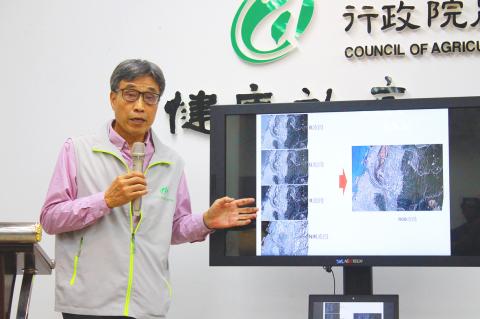The Council of Agriculture last month terminated a contract with a Taiwanese satellite image supplier after finding that its images were sourced from a China-based firm, a council official said yesterday, after local media raised information security concerns.
The council’s Agricultural Research Institute in May opened bidding to purchase hyperspectral satellite images, which are to be used to monitor crop growth and improve supply and demand.
The only Taiwanese firm that tendered a bid won it for NT$9.9 million (US$314,186), the Chinese-language Apple Daily reported yesterday.

Photo: CNA
However, only China’s Zhuhai-1 remote sensing satellite is able to satisfy the institute’s requirements for image resolution better than 10m with more than 30 wavebands, it said.
The images were actually to be supplied by a firm named Orbita Aerospace Science and Technology Co based in China’s Guangdong Province, it said, questioning the government’s resolve to develop its own space technology.
Council Deputy Minister Chen Junne-jih (陳駿季) told a news conference that officials terminated the deal on July 22 after finding it to be problematic.
There would be no penalty for breach of contract, given that it was terminated before the firm started to honor it, he said.
The bidding project aimed to purchase images taken by “commercial” satellites, while image analysis would be carried out by the institute, so there is no risk of leaking secure information, he said.
The Executive Yuan is to publish guidelines for blocking information and communication products that might jeopardize national security, while the council would set up clearer guidelines to prevent similarly controversial deals, Chen said.
Developing hyperspectral cameras for satellites involves high technical thresholds, and only the US and China are known to have the ability, National Space Organization Deputy Director-General Yu Shiann-jen (余憲政) said.
Taiwan still has a long way to go before it can autonomously develop such cameras, but it several years ago developed one for an aircraft, which is currently being tested, Yu added.

The Ministry of Economic Affairs has fined Taobao NT$1.2 million (US$36,912) for advertisements that exceed its approved business scope, requiring the Chinese e-commerce platform to make corrections in the first half of this year or its license may be revoked. Lawmakers have called for stricter enforcement of Chinese e-commerce platforms and measures to prevent China from laundering its goods through Taiwan in response to US President Donald Trump’s heavy tariffs on China. The Legislative Yuan’s Finance Committee met today to discuss policies to prevent China from dumping goods in Taiwan, inviting government agencies to report. Democratic Progressive Party Legislator Kuo Kuo-wen (郭國文) said

The Ministry of Economic Affairs has fined Taobao NT$1.2 million (US$36,900) for advertisements that exceeded its approved business scope and ordered the Chinese e-commerce platform to make corrections in the first half of this year or its license would be revoked. Lawmakers have called for stricter supervision of Chinese e-commerce platforms and more stringent measures to prevent China from laundering its goods through Taiwan as US President Donald Trump’s administration cracks down on origin laundering. The legislature’s Finance Committee yesterday met to discuss policies to prevent China from dumping goods in Taiwan, inviting government agencies to report on the matter. Democratic Progressive Party

Taiwan and its Pacific ally Tuvalu on Tuesday signed two accords aimed at facilitating bilateral cooperation on labor affairs, according to Taiwan’s Ministry of Foreign Affairs (MOFA). The governments inked two agreements in Taipei, witnessed by Foreign Minister Lin Chia-lung (林佳龍) and visiting Deputy Tuvaluan Prime Minister Panapasi Nelesone, MOFA said in a news release. According to MOFA, the agreements will facilitate cooperation on labor issues and allow the two sides to mutually recognize seafarers’ certificates and related training. Taiwan would also continue to collaborate with Tuvalu across various fields to promote economic prosperity as well as the well-being of their

Sung Chien-liang (宋建樑), who led efforts to recall Democratic Progressive Party (DPP) Legislator Lee Kun-cheng (李坤城), was released on bail of NT$80,000 today amid outcry over his decision to wear a Nazi armband to questioning the night before. Sung arrived at the New Taipei District Prosecutors’ Office for questioning in a recall petition forgery case last night wearing a red armband bearing a swastika, carrying a copy of Adolf Hitler’s Mein Kampf and giving a Nazi salute. Sung left the building at 1:15am without the armband and covering the book with his coat. Lee said today that this is a serious